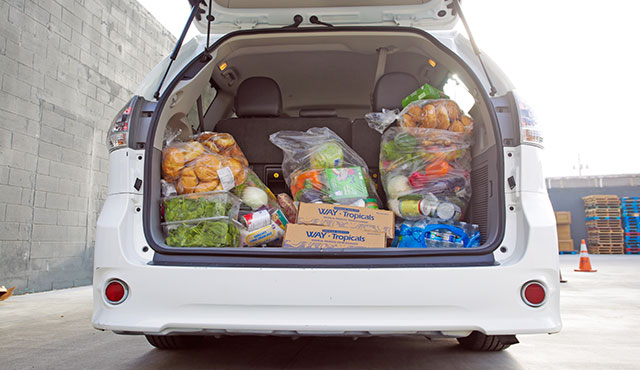Serving people in need has been a core tenet of the Catholic way, and for more than 44 years the Diocese has assisted struggling children, adults, families and communities.
Spearheading this ongoing mission is Catholic Charities of Orange County, which provides all manner of help: food distribution and nutrition education, immigration and citizenship assistance, counseling and psychotherapy, and much more.
As the first quarter of 2021 comes to an end, CCOC’s challenge to help ease the suffering of others, regardless of their background or religious affiliation, is greater than ever. More O.C. residents require help, due to the medical, economic and emotional fallout of the COVID pandemic. But CCOC is up to the challenge.
“Many of those we now help worked in the services industries, in restaurants, hotels and personal care businesses like salons,” says Ellen Roy, Catholic Charities of Orange County’s executive director. “They lost their business or job in the past year. Demand for our services will continue to go up post-COVID,” she adds, noting that the need for food-distribution, counseling and immigration services in particular is very high. “More people are hungry, depressed and upset.”
The manner in which CCOC delivers its services has changed. One example, Roy says, is the way food is provided at the Cantlay Food Distribution Center. “Before the pandemic, people would walk inside and pick the food they needed. When COVID hit, we had to switch to a drive-through service. Pre-COVID, we’d help 200 to 300 families a week. Now, with drive-through, we’re up to 2,700 a week.” (Located at 2020 W. Chestnut Ave., in Santa Ana, Cantlay is open from Tuesday through Thursday, from 7 a.m. to noon.)
“Today we’re always in need of volunteers to pass out food,” Roy says. “It’s one of our bigger challenges. You’re inside the pantry and you have to put [a food order] into a grocery cart. Then you move it outside and load it into the cars. It’s a workout. The volunteers are the heartbeat of this service. We couldn’t do it by ourselves.”
The pandemic has also changed the operation of CCOC’s CampReCreation, in the past a weeklong getaway for clients with special needs and their loved ones. “Today we now only have one-day events, with different themes,” Roy says. “We had Christmas with Santa, Halloween and a day with Easter baskets. We’re also looking to give more support to caregivers at the camp. That includes counseling services.”
Despite challenges like these, one of Roy’s top priorities is to expand CCOC’s services, particularly in community outreach, a service element that she refers to simply as “emergency assistance.” Rather than offer acts of temporary aid to deal with singular crises as they crop up, “We need to be a bridge to permanent solutions to help people, not just hand them a gift card to a local fast-food place. People are chronically on the streets, and we want to provide permanent solutions.
“Our whole mission with our counseling, immigration [help], food distribution and more is to have people take advantage of all of our services, not just one,” Roy says. “We can make a difference and help lift them out of poverty.” A key long-term strategy, she reiterates, is to furnish this help to those in need on a permanent basis.
Another CCOC priority involves upgrading and leveraging technology to meet today’s changing needs. For example, the New Hope Crisis Hotline, which receives calls worldwide, is undergoing a significant digital shift. “A lot of our volunteers there were seniors who had to stop coming in after COVID hit,” Roy says. “So we’re getting a new phone system that will allow volunteers to take calls from home. … And we now do virtual counseling, via Zoom. That way we can help more people.”
While a life of poverty and stress can be traumatic for Catholic Charities’ many clients, it’s also hard on service providers, notes Roy. “It’s traumatic for them, especially in the areas of immigration help and counseling,” she says, adding that this trauma, regularly shared with staffers, can lead to emotional burnout. “So it’s important that staff be trained to deal with these clients. When we pick up the phone, we often have a person who has experienced trauma. Poverty itself creates trauma. Knowing how to speak with [clients] and comfort them is important.”
Roy would like to see Catholic Charities have a closer collaboration with the Diocese, particularly with the local parishes. “We want to work more closely with them, to help them deliver more services to their parishioners and to also make our own services available to them. … Moving forward, it’s important that [O.C. residents] understand who we are and what we do. They’re very generous, but we have to get the word out.”
Members of the Diocese can help CCOC’s ongoing mission by volunteering; the critical need at the Cantlay Food Distribution Center is but one example. Visit ccoc.org/about/volunteer to fill out an online application. And give what you can to those in need by visiting ccoc.org/donate.

